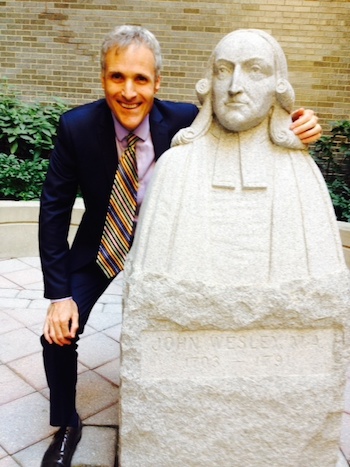John Wesley’s Prayer
John Wesley is close to the office. We’re only half a block away from the John St. Methodist Church, founded in 1766, the oldest Methodist congregation in America.
The current church dates from 1840. Like a lot of churches in New York, it’s open during the day for prayer and meditation.
I like going there, sitting in the old pews or when the weather is warm, sitting outside in the courtyard where John Wesley reigns supreme in granite with clerical collar and 18th century curls.
 No, I’m not a Methodist but I’m grateful for all John Wesley did, for his courageous stand against slavery in an era when it was an acceptable means of commerce, for his passionate preaching, for his zeal in reforming the Church of England of its corruption and lukewarm faith, for his love of his brothers and sisters in Christ, the way he always stressed Jesus great command “to love thy neighbors as thyself.”
No, I’m not a Methodist but I’m grateful for all John Wesley did, for his courageous stand against slavery in an era when it was an acceptable means of commerce, for his passionate preaching, for his zeal in reforming the Church of England of its corruption and lukewarm faith, for his love of his brothers and sisters in Christ, the way he always stressed Jesus great command “to love thy neighbors as thyself.”
I can’t imagine a satisfying life of worship and praise without the glorious hymns written by his brother and co-religionist Charles Wesley: among them, “Hark! The Herald Angels Sing,” “Love Divine, All Loves Excelling,” “Christ the Lord Is Risen Today” and especially at this Advent season, “Come Thou Long Expected Jesus.”
As the story goes, John Wesley, already ordained an Anglican priest, was listening in 1738 to Martin Luther’s preface to the Book of Romans being read aloud when he “felt his heart strangely warmed” and at that moment knew the transforming power of God’s grace, “free in all, and free for all.”
Haven’t we all experienced in faith what it is to have our hearts so “strangely warmed?” Isn’t it what lies behind the desire of all our prayers?
Wesley’s life wasn’t always happy. His marriage was disastrous. He had no children. He faced persecution and constant criticism, but he never quit, preaching in the great out-of-doors a bit like St. Francis before him, when he wasn’t allowed to preach from the pulpit, taking the word to those who wouldn’t have had it.
The disciples of Jesus exist in every era. I pray that I see and recognize them today and hear them, listening to their prophetic call. But how grateful I am to be able to connect with the saints of the past, as I sit outdoors next to that bust of John Wesley.
With him, through him, through Christ, I echo his words, “God grant that I may never live to be useless!” A life lived so intentionally never can be and never is.